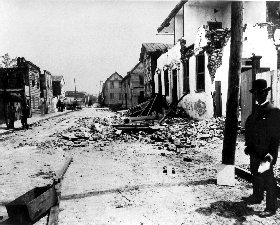But this is the reality: architecture is of utmost importance, and it is by all means, a matter of life and death. The proof: The 7.0 magnitude earthquake in Haiti, where the death toll is now reported to be up to 180,000, and will likely exceed 200,000--making it the deadliest "instant disaster" in modern Western history.
So how is it that a 7.0 magnitude quake in Haiti can cause over 15,000 times the casualties that a 9.6 magnitude quake outside of Anchorage can cause (1964)? The answer is architecture. The same as the how the deadliest earthquake in history, the 1556 Shaanxi, China earthquake, which killed over 860,000 people. In Shaanxi, a region with landforms nearly identical to the Upper Missouri River area (Loess Hills in Iowa/Nebraska), the inhabitants live in dugouts (and still do today) carved into the side of incredibly fertile hills. The loess hills don't have rigid bedrock inside of them providing structure, so when an earthquake hit it, the hills basically turned into jello, along with the people living in them. The same will happen if an earthquake hit it today.
In Haiti, a country that surprisingly actually does have building codes, the problem was enforcement of building codes--to the point that it made enforcement of Downtown OKC urban design guidelines look pretty solid. The result in Haiti was everybody living in shacks with absolutely no support columns. Sometimes a family would build a shack, and then build a shack on top (a sort of rudimentary "loft" if you will) because they could get rent for it, and then another shack on top of that if it would bring in rent, and so on. And Haiti is a known earthquake zone as well.
 In Alaska there are building codes that are actually enforced, and the result when an earthquake hits, is very few casualties (comparatively). Charleston was hit by a 7.0 magnitude earthquake which leveled the city, and today there is subsiding earthquake threat along the South Carolina coast, believe it or not (not nearly as imminent as the Memphis area though, a disaster waiting to happen). The result is that the city of Charleston has building codes that are very, very similar to those of San Francisco--in fact that's why you see so few tall buildings in a city of 644,000 people (metro).
In Alaska there are building codes that are actually enforced, and the result when an earthquake hits, is very few casualties (comparatively). Charleston was hit by a 7.0 magnitude earthquake which leveled the city, and today there is subsiding earthquake threat along the South Carolina coast, believe it or not (not nearly as imminent as the Memphis area though, a disaster waiting to happen). The result is that the city of Charleston has building codes that are very, very similar to those of San Francisco--in fact that's why you see so few tall buildings in a city of 644,000 people (metro). So yes, architecture is important. And yes, it is a matter of life and death. It is also a matter of commercial output, as we know environment is a major factor in productivity. It's also a matter of security and crime deterrence, as we know that good architecture can reduce the chance of a crime occurring..and ample lighting at night should of course be a no-brainer. I could go on and on, listing everything impacted by architecture. There are 3 things that make up architecture: Firmitas (form, or structural support), Utilitas (utility, or how a building will be useful), and Venustas (an architect's attempt to create a pleasing building). All three of these aspects are integral and in my opinion, you can't do without. Without Firmitas, you have a situation like Haiti or Shaanxi. Without Utilitas, you have buildings that are either inefficient or have a short lifespan. Without Venustas, you have an environment people won't rationally care about.



No comments:
Post a Comment